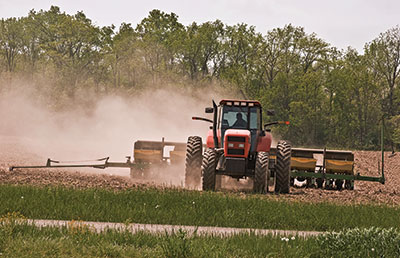2023 Depreciation Options (AND ISSUES)

As we enter heat of tax planning season (my favorite time of year), depreciation is always an area of focus as producers decide how much they want their net incomes to be at the end of the year. Since September 2017 we’ve lived in a world where essentially 100% of all farm assets (equipment, trucks farm buildings, grain bins and tile) could be written off in full in the year of acquisition using either bonus depreciation or Section 179 or a combination of the two. Things have changed for 2023.
Section 179
Section 179 remains at a high write off threshold. A producer can write off $1,160,000 in equipment additions given they do not place in service more than $2,890,000 during the tax year. If items in excess of this amount are acquired, the deduction starts to phase out. While this number seems very large, if you are a large farmer that turns their equipment every year it can add up fast. The net cash paid at the trade may not be much, but under the trade rules put in place by the Tax Cuts and Jobs Act of 2017 you use the gross sticker price of the new piece of equipment to determine these limits, not the net. That said, the trade of two X9 combines and a new tractor and a planter can easily push the boundaries of what’s available for Section 179.
Bonus Depreciation
I do not think any of us ever expected to see this actually happen, but nothing has been done to “correct” the declining bonus depreciation percentage. For assets acquired on or after January 1, 2023 you are only allowed to bonus 80% of the asset’s cost. For instance, if you spend $500,000 putting up a machine shed $400,000 can be expensed in the first year and the remaining $100,000 has to be put on a depreciation schedule over a twenty-year period. While still a valuable deduction, the sliding scale has made the use of bonus depreciation more complicated. Also, do not forget that certain states do not allow bonus depreciation at all which can lead to some unexpected tax due.
Gain on Sale
The change in the bonus depreciation rules has created a bigger issue with equipment trades. If you recall, post 2017 farmers treat trades of equipment as sales and record the gain on the transaction. They can then depreciate the full value of the new piece of equipment. In prior years, bonus depreciation has netted these two transactions. For instance, assume a new planter purchase at $450,000. The planter traded in was valued at $110,000 and in the farmer’s mind, he intended to use the net $340,000 paid in cash for the planter as a deduction on 2023 taxes. In prior years, the farmer would show a $110,000 gain on sale on Form 4797 and then use bonus depreciation of $450,000 to get to the net impact of $340,000. For 2023, the farmer would show a gain of $110,000 and a deduction of $378,000 ($360,000 bonus depreciation at 80% plus the balance of $90,000 on a five year schedule with $18,000 being the first year depreciation amount), netting to only $268,000 in expense.
The percentage of the asset eligible for bonus depreciation will decline to 60% for assets acquired after January 1, 2024. If Section 179 is available, chose it first as the netting issue will not exist in this scenario. However, for machine sheds and landlords with tiling expense, bonus depreciation will continue to be the only option. As you finish up your year end planning, make sure to consider this change in your projections.
Kelly Jackson Hardy is a certified public accountant and business advisor specializing in income taxation, accounting services, and succession planning for farmers, privately-held elevators and supply dealers, and cooperatives. Kelly is a principal with CliftonLarsonAllen in Princeton, Illinois, as well as a regular speaker at tax and estate planning seminars. Kelly was raised on a hog, row crop and cattle farm in central Illinois and has been involved in the ag industry her entire life. Kelly, her husband, and two sons are active in 4-H and operate a small feeder calf operation and pumpkin business.

when you talk about Landlords with tiling expense can’t take the section 179 deduction are you talking about landlords that rent their land for cash, and not crop share landlords? It is my understanding that unlike cash rent landlords, crop share landlords, whether or not they materially participate under the lease, may be eligible for section 179 expense deduction, but they have to watch the noncorporate lessor rules.